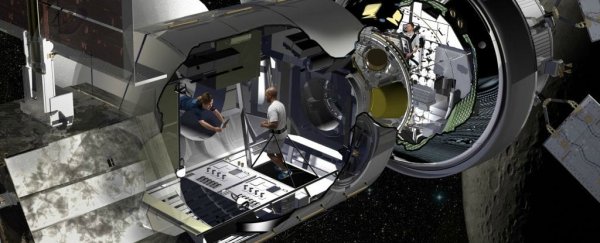An aluminium cargo container, built more than 15 years ago to move large equipment to space, will be transformed into a prototype of a space habitat where astronauts would live during long missions.
The project is a step toward NASA's next big human spaceflight project called the Deep Space Gateway, a "spaceport" in the Moon's orbit where astronauts would live for up to a year.
NASA's goal is to have it up and running by the mid-2020s, and from there, the space agency hopes to gain some experience and develop capabilities needed to push farther into the solar system, specifically to Mars.
Colorado-based Lockheed Martin, a NASA contractor, announced last week that it will refurbish the cargo space container into a habitat prototype.
It won't look like much on the outside - just a massive cylindrical metal container, about 21 feet long and 15 feet in diameter.
The interior will be turned into a living quarter, with robotics work stations for astronauts, a place to exercise and storage spaces for food, water, toiletries - "all the things you need to live and be happy in space," said Bill Pratt, of Lockheed Martin.
"It is easy to take things for granted when you are living at home … Something as simple as calling your family is completely different when you are outside of low Earth orbit," Pratt said in a news release.
"While building this habitat, we have to operate in a different mindset that's more akin to long trips to Mars to ensure we keep them safe, healthy and productive."
Named Donatello, the cargo container was one of three built by the Italian Space Agency in the 1990s to serve as "moving vans" carrying equipment, experiments and supplies to and from the International Space Station, a large spacecraft orbiting Earth and where astronauts have lived since 2000.
Donatello was delivered to NASA's Kennedy Space Center from Italy in 2001.
While the two other cargo containers, called Leonardo and Raffaello, flew on several shuttle missions to the International Space Station, Donatello was never used.
Lockheed Martin will refurbish Donatello at the Kennedy Space Center in Florida. The work would take about 18 months.
Although Donatello was originally built to be flown to space, the refurbished hardware won't make it there, Pratt said. Lockheed will turn over its prototype to NASA, which will then start looking at building the actual habitat, Pratt said.
"It's a steppingstone to the actual flight vehicle and pretty representative of the actual thing that flies," Pratt said.
The Deep Space Gateway habitat will be docked to a spacecraft called Orion, the "exploration vehicle" that will carry astronauts to space.
Pratt said it's still too early to say how much the prototype would cost.
Lockheed Martin is one of six US companies NASA contracted to build habitat prototypes for the spaceflight project.
The Deep Space Gateway, which focuses on sending astronauts on extended missions in the moon's orbit, is a far more modest goal than reaching Mars.
But, as The Washington Post's Joel Achenbach wrote, it's more technologically doable in the near term under plausible budgets.
NASA said it hopes to send humans to Mars by the 2030s.
2017 © The Washington Post
This article was originally published by The Washington Post.
